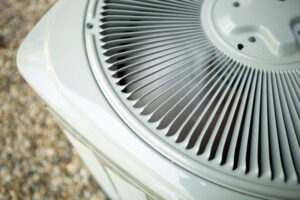 People who aren’t in the HVAC industry often have misconceptions about how air conditioning systems work, specifically the role of refrigerant. Homeowners often imagine that refrigerant is a fuel for the air conditioner, something that will eventually run out and need to be refilled.
People who aren’t in the HVAC industry often have misconceptions about how air conditioning systems work, specifically the role of refrigerant. Homeowners often imagine that refrigerant is a fuel for the air conditioner, something that will eventually run out and need to be refilled.
Refrigerant is not a fuel source. Air conditioning systems run on one type of energy: electricity. A refrigerant is a heat transfer medium. It’s what allows an air conditioner to pump heat from a house to the outside. The refrigerant works, in some ways, like blood in the human body: a pump circulates it to allow the system to run. But if the human body loses blood, it creates more. If an air conditioning system loses refrigerant, it can’t create more and will be in serious danger until it receives professional AC repair in Lawrenceville, GA.
The Problem of Leaking Refrigerant
Now that we’ve explained that refrigerant isn’t an energy source but used for heat transfer, we can better explain why leaks are big trouble. As refrigerant moves through the AC, it shifts between a liquid and a gas. Changing from one phase to the other is how the refrigerant absorbs heat from indoors (evaporation) and releases heat outdoors (condensation). The refrigerant doesn’t dissipate during this cycle, so the amount of refrigerant in the air conditioner—referred to as the AC’s charge—won’t change during the system’s service life…
…unless there are leaks. Unfortunately, leaks are a common issue with air conditioners. The reaction between the copper refrigerant lines and chemicals and volatile organic compounds (VOCs) in the air can lead to corrosion, often on an air conditioner that’s about five years old. The corrosion patches weaken the copper lines enough to allow the high-pressure refrigerant gas to escape and begin lowering the AC’s charge.
Loss of refrigerant will affect how well an air conditioner can cool a home, but this isn’t the only problem. Because the AC is designed for a specific charge, the entire system will work less efficiently when the charge drops and refrigerant pressure changes. The part that is in the most jeopardy is the compressor, the literal heart of the system. Loss of refrigerant puts the compressor in danger of burning out. A failed compressor is an expensive replacement, and often it’s more cost-effective to replace the entire AC instead.
Watch for Warning Signs of Leaks
Catching leaks early gives you a chance to call our professional repair technicians. We can locate the leaks, seal them, and then restore the correct refrigerant charge. There are several warnings of refrigerant leaks to watch for:
- The evaporator coil begins to ice over.
- A hissing sound from the AC cabinets.
- Humidity levels in the house start to rise without any cause.
- The AC begins to short-cycle (shutting down early, then turning back on again a short time later)
- Electrical bills make a sharp rise.
- The AC struggles to keep up with normal cooling demands.
Call us when you notice these signs. The trouble may not be a refrigerant leak, but we’ll solve whatever it is!
At Snellville Heating, Air and Plumbing, “Your comfort Is OUR Business!” Schedule AC repair service with our experts.




